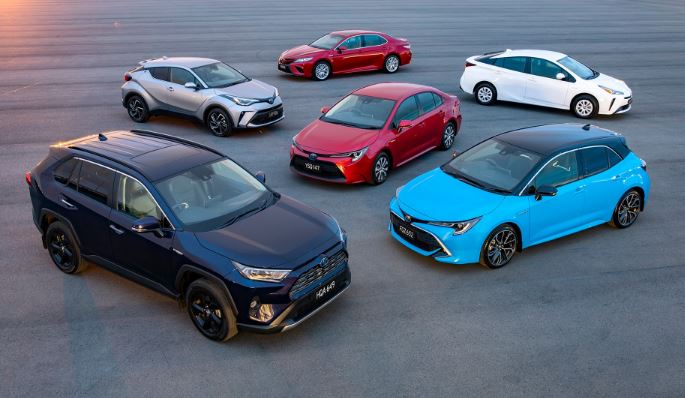Toyota Motor plans to offer hybrid options for all major models in the U.S. by 2030, reinforcing its strength in hybrid vehicles amid market uncertainties for electric vehicles (EVs). At a recent test-drive event at Toyota’s North American headquarters, half of the 26 models showcased were hybrids, while only two were electric vehicles.
Kevin Butt, regional environmental sustainability director at Toyota Motor North America, announced that hybrid options for all key models will be available by 2030. Many of Toyota’s popular models, like the Camry sedan, which went hybrid-only this spring, and the Crown Signia sport utility vehicle launching this year, will be exclusively sold as hybrids.
Toyota has seen significant growth in hybrid sales, selling over 50,000 new Camrys this year, quadruple the total from 2023. Overall hybrid sales in the U.S. increased 66% year-on-year to 410,000 vehicles in the first half of the year. Hybrids made up 33% of Toyota’s North American vehicle sales from January to May, a 6 percentage point increase from 2023.
The Japanese automaker, along with its luxury Lexus brand, holds nearly 60% of the U.S. hybrid market. Toyota plans to expand its lead as EV sales growth slows in the U.S. Since 2023, inflation and high interest rates have discouraged potential EV buyers, while demand from early adopters has declined. Hybrids, being more fuel-efficient than gasoline-powered vehicles and around 20% cheaper than EVs, have gained popularity. According to Cox Automotive, hybrids accounted for 9% of new U.S. automotive sales in January, compared to 7% for EVs.
Mike Ramsey at Gartner predicts that hybrid sales will continue to outpace EV sales in the U.S. for some time. Reflecting this shift, the U.S. government in March adjusted its target for new vehicle sales to be electric by 2032 from 67% to at least 35%, including a new target for hybrids to make up at least 13%.
The U.S. government’s recognition of hybrids as a green alternative supports Toyota’s strategy. Toyota aims to increase its North American sales from electrified vehicles, including EVs and hybrids, to around 80% by 2030, up from the current 40%.
Toyota’s share of the North American passenger car market was 15% from January to June, second only to General Motors (GM) at 16%, with Ford, Hyundai, and Honda completing the top five. Following the U.S. government’s policy change, GM and Ford, previously focused solely on EVs, have also started to emphasize hybrids and plug-ins. However, GM currently has no hybrids or plug-ins in its lineup, and Ford’s hybrid sales are only one-fifth of Toyota’s.
Toyota’s biggest competitor, Honda, holds only 20% of the hybrid market. A Honda executive admitted, “We don’t have the scale to produce dedicated hybrid-exclusive vehicles like Toyota.”
Toyota’s dominant market share reflects its history over the past 20 years. The first-generation Prius, the initial mass-produced hybrid, was released in 1997, with North American sales starting in 2000. Being the first to market allowed Toyota to become synonymous with hybrids in the U.S.
Hybrids have become a significant profit source for Toyota. After years of technological development, a Toyota executive noted that costs for hybrid systems and operations have been reduced to the point where producing more hybrids increases profit margins. Some hybrid SUVs sold in North America have a profit per vehicle 10% higher than gasoline-powered models.
The North American market is increasingly important for Toyota. Quality assurance scandals in Japan have led to a prolonged suspension of flagship vehicle production. Meanwhile, business in China has slowed due to intensifying EV competition, and in Southeast Asia, Chinese automakers have begun aggressive exports. Toyota and Lexus brand vehicle sales in the U.S. totaled about 2.7 million units in the year ending in March, accounting for nearly 30% of all sales. The company’s operating profit from the U.S., including exports, is estimated to be 30% to 50% of its total.
Despite falling behind key players like Tesla in EVs, Toyota is making progress. How Toyota will balance its hybrid and EV operations depends on the outcome of the U.S. presidential election in November. Former President and Republican nominee Donald Trump opposed EV efforts during his term and currently opposes the Biden administration’s EV promotion. The Republican Party’s platform calls to “cancel the electric vehicle mandate and cut costly and burdensome regulations.”
Trump’s potential election could impact Toyota beyond EVs. Historically, Toyota has donated to Republican candidates but faced backlash from Trump in 2017 over plans to build a factory in Mexico. Toyota eventually scaled back its investment. Now, Toyota imports hybrid vehicles and parts to the U.S. A Toyota executive warned, “If Trump wins and imposes high tariffs, U.S. supply chains could shift dramatically.”
Recently, Trump has grown closer to Elon Musk, and some believe Musk may influence Trump’s stance on EVs. Musk and Trump met in March and are reportedly in regular contact. Musk expressed support for Trump after an assassination attempt on July 13 and plans to donate around $45 million a month to a pro-Trump organization.
Toyota’s future strategy in hybrids and EVs will be influenced by these political and economic developments.

